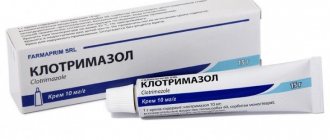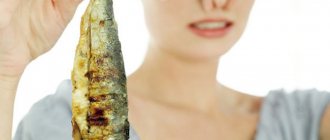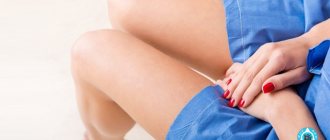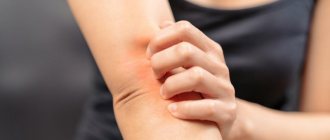- Home /
- Branches /
- Gynecology and obstetrics /
- Itching and burning in the intimate area
Itching and burning in the intimate area, which occur against a background of redness and inflammation, is the most common reason for visiting a gynecologist and dermatovenerologist. Before starting treatment, specialists at the Yauza Clinical Hospital establish the cause of this discomfort by conducting all the necessary laboratory tests. Etiotropic treatment (aimed at eliminating the cause) usually quickly leads to the elimination of the symptom.
Most often, such complaints arise with the development of vulvovaginitis and contact dermatitis. Itching and burning in the anogenital area not only disrupts an active life, but also contributes to the occurrence of pain during sex, and the appearance of these symptoms in postmenopause is a serious problem for a woman, which can sometimes lead to cancer.
Make an appointment with a gynecologist
The essence of the disease
The pregnant woman’s body does not always respond adequately to the medications she receives. A non-standard, negative reaction to drugs is called individual intolerance or allergy.
Most often it develops on drugs containing protein compounds. After all, it is the protein, recognized by the immune system as foreign, that causes the body’s excessive response to the invasion.
Allergies have many unpleasant manifestations, such as runny nose, lacrimation, changes in the skin, itching, and swelling. With severe intolerance, Quincke's edema or anaphylactic shock develops. These are life-threatening conditions that require immediate medical attention.
Period influence
During pregnancy, many chronic diseases worsen, including allergic manifestations that become more pronounced. The opinion that allergies occur as a result of pregnancy is based precisely on the increased sensitivity of the immune system at this time.
Pregnancy itself does not cause an inadequate reaction to foreign protein. But during this period, the functioning of the immune system changes: all substances that enter are perceived as a danger to the child and the mother’s body. This means it needs to be neutralized. The same mechanism is associated with increased food allergies and hypersensitivity to animal fur.
Popular questions
Severe itching on the labia, irritation.
There is nothing to worry about in the vagina itself. What could it be? This may result in an allergic reaction or inflammation. I recommend using Ginocomfort gel with mallow extract, applying it once a day to the discomfort zone for 7 days. If you do not notice relief, consult a doctor.
I began to experience itching in the intimate area, but not always after the cycle and before it intensified, my periods began to get confused. There are no such discharges, they are in the form of curds without any particular smell. Half a year ago I suffered from severe stress, I took hormones, I haven’t taken prednisolone for 4 months, maybe it’s related to menopause. I’m 42 years old, I have congenital heart disease, I take strong pills for the lungs.
Hello! You need to contact an obstetrician-gynecologist and conduct an examination to exclude an inflammatory process in the genital tract. This may be the main cause of discharge, itching and irregular periods. And then, if necessary, an examination for the level of sex hormones. Before receiving test results, you can use Gynocomfort gel for intimate hygiene, which will help prevent the spread of inflammation and discomfort in the genital tract.
Hello! Worries about itching, a small amount of discharge, burning during sexual intercourse. There is no unpleasant smell. As soon as I started using Hexicon candles. It all started a few days before I got sick. I had thrush in the summer, could this play a role? What could it be? Can I cure it on my own? What means are best to use? Thank you in advance.
Hello! When you have a cold, the body's defenses are reduced, which can affect the condition of the mucous membranes of the genital tract. The use of an antimicrobial drug without a preliminary examination - a smear on the flora and detection of inflammation - is not advisable. To eliminate dryness in the genital tract, you can use Ginocomfort gel with mallow extract. This will not only eliminate itching and burning, but also compensate for the lack of hydration. The gel is applied 1 time per day, 1 dose as needed.
Itching in the vagina, I haven’t tried anything and it doesn’t help. Glassy discharge. 54 years old, going through menopause.
Hello!
Itching may be associated with an infectious factor: candidiasis, bacterial vaginosis, condylomatosis or age-related endocrine disorders. In both cases, it is necessary to relieve the manifestations of inflammation and create additional hydration. To clarify a possible infection, I recommend that you consult a doctor and conduct an additional examination. At this stage, I recommend using Ginocomfort gel with mallow extract as a starting treatment. The product has an anti-inflammatory effect, moisturizes and nourishes the structure of the mucous membrane. The gel is applied once a day without restrictions on the time of use. For an accurate diagnosis, contact a specialist
Features of the drug
Medicines containing proteins can also cause allergic reactions. These include hormonal drugs, especially those that contain natural analogues of human hormones.
One of these medicines is Utrozhestan. Its purpose is to maintain the ongoing pregnancy, because it must compensate for the insufficient production of progesterone. It is available not only for oral administration, but also for intravaginal administration. The latter method reduces the number of negative side effects.
Taking this drug stimulates an increase in the thickness of the uterine mucosa, which prepares it for the attachment of a fertilized egg. Subsequently, this will create conditions for normal growth and development of the embryo. Utrozhestan prevents abortion and reduces the excitability of the uterine muscles.
Like other hormonal drugs, Utrozhestan has contraindications. It is not prescribed if the pregnant woman:
- prone to blood clots;
- suffers from liver diseases;
- has confirmed or suspected malignant tumors.
Treatment
Allergies require both eliminating the cause and alleviating the patient’s condition. For this, various medical and folk remedies are used.
Reception of analogue
The first and most proven way to eliminate an allergic reaction is to change the drug. The doctor selects a medicine with a similar effect, but a different composition. In some cases, it is enough to change only the form of administration.
Medicines
Modern medicine uses a significant number of antiallergic drugs, but, unfortunately, the vast majority are not suitable for use during pregnancy.
Thus, in the first trimester, antihistamines are contraindicated, since at this time the formation of all organ systems of the unborn child occurs, and placental protection is still absent.
After week 12, the doctor may prescribe some antihistamines if there is a clear need for this and the expected benefit will be greater than the harm caused.
Antihistamines such as Loratadine and Cetirizine are used to relieve severe allergy symptoms in the second trimester, but only under the strict supervision of a doctor. Restrictions on taking antiallergic drugs also apply to creams and ointments that are used for local treatment of allergic rashes and elimination of itching and swelling.
Creams and ointments
To alleviate allergies, pregnant women can use creams and ointments with an anti-inflammatory effect. One of the most popular drugs is Bepanten. It successfully heals cracks and scratches in itchy areas. Psilo-balm and Elidel are also considered effective.
Folk
Proven folk remedies that relieve itching and irritation are more widely used. During pregnancy, decoctions of medicinal herbs that have not previously caused allergic reactions are best suited. Herbal remedies such as:
- chamomile flowers;
- calendula flowers;
- sage leaves;
- nettle herb;
- Oak bark.
Itching due to a violation of the vaginal microflora, video
is not responsible for the accuracy of the information presented in this video clip. Source - About the most important things
Author: Oksana Anatolyevna Gartleb, obstetrician-gynecologist of the highest category, head of the gynecological department of the Medgard-Saratov network of multidisciplinary clinics
Sources:
- COMPREHENSIVE TREATMENT AND PREVENTION OF ESTROGEN-DEPENDENT UROGENITAL DISORDERS: CLINICAL ASPECTS AND PHARMACOECONOMIC ANALYSIS. Ledina A.V., Kulikov A.Yu. // Pharmacoeconomics. Modern pharmacoeconomics and pharmacoepidemiology. – 2009. – No. 1. – pp. 13-18.
- VAGINAL CANDIDOSIS. POSSIBILITIES OF DRUG THERAPY. Makarov I.O. Sheshukova N.A. // Obstetrics, gynecology and reproduction. – 2012. – No. 1. – pp. 16-19.
- Vaginal infections – from diagnosis to rational complex therapy. Blinov D.V. // Obstetrics, gynecology and reproduction. - 2011. - 4: pp. 44-47.
- Treatment of acute candidal vulvovaginitis. Minkina G.N. // Gynecology. — 2001.– No. 3(6).– P. 208-209.
- Current problems in the treatment of urogenital candidiasis. Kongurov N.V., Gerasimova N.M., Vishnevskaya I.F. // Obstetrics and gynecology. – 2005.- No. 4. – P. 50-53
- https://stuklopechat.com/zdorove/130068-narushenie-mikroflory-vlagalischa-prichiny-i-simptomy.html
- https://medcraveonline.com/MOJWH/MOJWH-07-00197.pdf
- https://www.pnas.org/content/108/Supplement_1/4680
- https://www.researchgate.net/publication/312500859_AN_INVESTIGATION_FOR_VAGINAL_MICROFLORA_IN_THE_PA…
conclusions
The use of Utrozhestan, like other medications, during pregnancy can cause an allergic reaction. It manifests itself in the form of a skin rash, itching, and nausea.
To alleviate the condition, you can use various anti-inflammatory drugs, including ointments and herbal decoctions. Taking antihistamines is possible only in exceptional cases under the supervision of a doctor.
Girls, please help me with advice, who knows.
Pregnancy 10 weeks, very desired, after IVF. Yesterday, out of the blue, a burning sensation and itching appeared in the po area. In the past there was frequent thrush, recurrent genital herpes, and nonspecific colpitis.
I do not know what to do. I checked for everything hidden a hundred times, I haven’t had sex for 2 months, it’s prohibited. There is no particular discharge, although it is difficult to determine because I am inserting utrogestan. There are no herpetic blisters either, it seems. I called the fertility specialist - I thought he would tell me to come, he said, it’s okay, just wait a few days and everything will pass. But I doubt something. I never got over this problem on my own, it only got worse. I called the doctor from the residential complex - she also said that there is no need to rush to take tests (maybe there is no need, in the past, after the introduction of a speculum, all my symptoms worsened), but maybe it is necessary - only they will be done for a few more days ( (She advised adding pimafucin - but it only helped me the first couple of times, and then stopped, + it’s only for thrush, and I’m not sure that’s it. The last time 3 months ago there were 40-50 leukocytes in the smear and similar symptoms, but candidiasis was not found, they prescribed hexicon - the opposite effect, terzhinan helped. I asked about it and the doctor said that it is possible. I read the instructions and descriptions on the Internet - they write different things. In some places, it is possible without restrictions, in others - only if the intended the benefit outweighs the risk to the fetus, and that it is completely safe only after 12 weeks. Well, what should I do now?! I can be patient as long as I like, what if the baby suffers irreparable harm?! I don’t know what’s worse — lecheia or infection? Please tell me, has anyone had similar problems?
My doctor told me that the itching and burning was caused by taking utrozhestan. It was the same. When I reduced the dose, the itching went away. Maybe because of this?
I'm afraid not. I've been taking it for over two months now - I've never had anything like this before. :(
It looks like it's herpes after all. I looked under the lamp - it looks like there are microscopic bubbles:(. I looked up a bunch of articles - most of them write that the danger of a relapse is small - and it’s still so scary:(.
Lubricate your blisters immediately. Just not acyclovir (Zovirax), it penetrates the placenta. If there are relapses, then there is nothing particularly scary.
Let's try to figure out what are the most common causes of itching?
It is important to understand exactly what problems can cause itching in the intimate area in women:
- Thrush. Unfortunately, no woman is immune from this unpleasant fungal disease, and those with weak immunity are especially susceptible to it. Vaginal itching is one of the main symptoms of thrush.
- Trichomondiasis. With the development of this sexually transmitted disease, acute itching of the vagina and labia occurs, as well as a large amount of liquid discharge and pain during urination. If you experience these symptoms, see your doctor as soon as possible for treatment.
- Hormonal changes.
Expert opinion
During perimenopause and menopause, women often experience itching and burning in the vagina. This is due to a decrease in the level of estrogen production, which leads to a gradual decrease in the synthesis of vaginal lubrication and thinning (atrophy) of the vaginal walls.
Obstetrician-gynecologist of the highest category Oksana Anatolyevna Gartleb
- Psychological reasons.
Stress and anxiety often cause skin irritation.
Psychological tension and stress are often the cause of intimate itching
- Uncomfortable underwear. Wearing underwear made from synthetic fabrics that is too tight has an irritating effect on the skin and vaginal mucous membranes.
To diagnose the causes of itching and determine treatment, be sure to contact a specialist who will conduct an examination and take tests.
Your obstetrician-gynecologist will tell you how and how to treat itching in the intimate area. As an additional remedy, you can use the intimate restorative gel "Gynocomfort", which is recommended for eliminating vaginal discomfort, itching and burning, normalizing microflora and restoring the vaginal mucosa after infectious and inflammatory diseases and in the period after treatment with antibiotics. Its composition is carefully balanced - it was developed by specialists from the pharmaceutical company VERTEX. The product has undergone clinical studies, which have proven its high effectiveness as part of complex therapy for candidiasis and dysbiotic conditions. Like all Ginocomfort products, the gel has the necessary documents and certificates.











